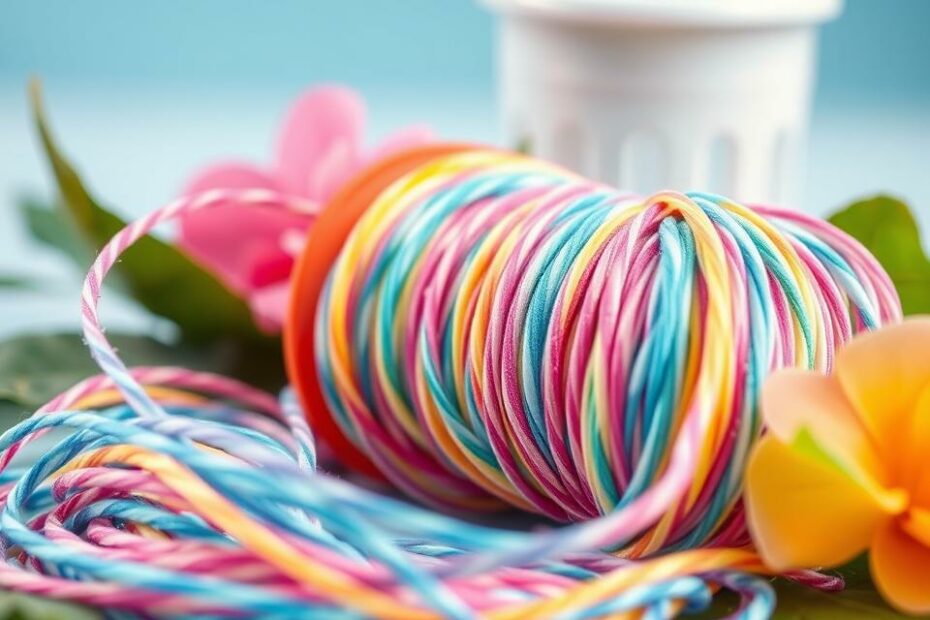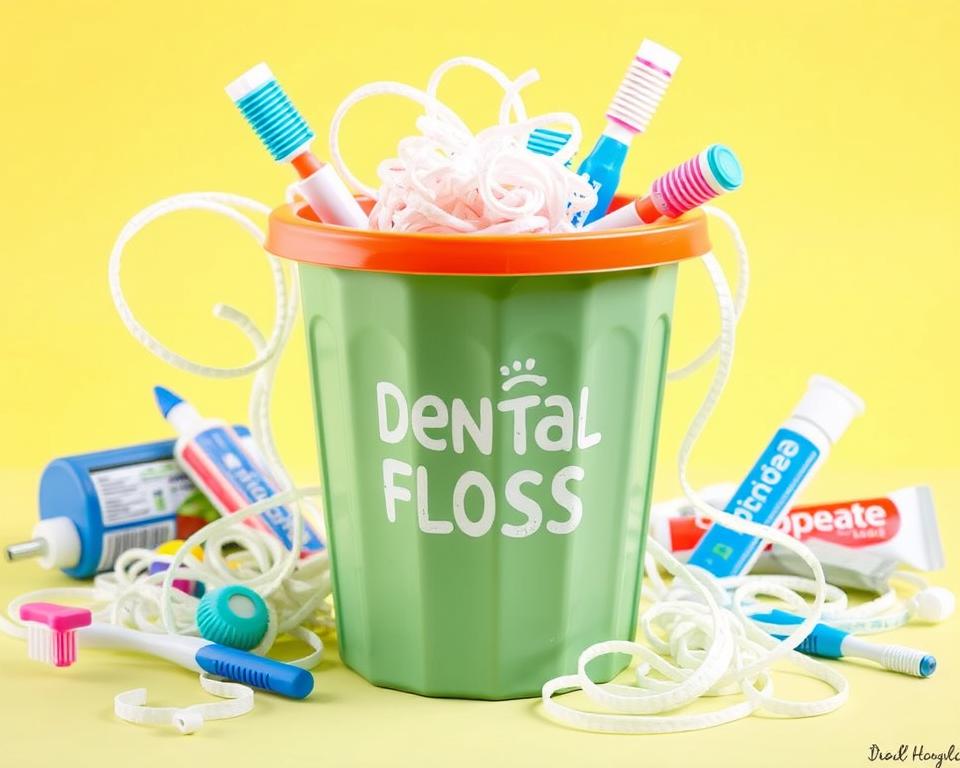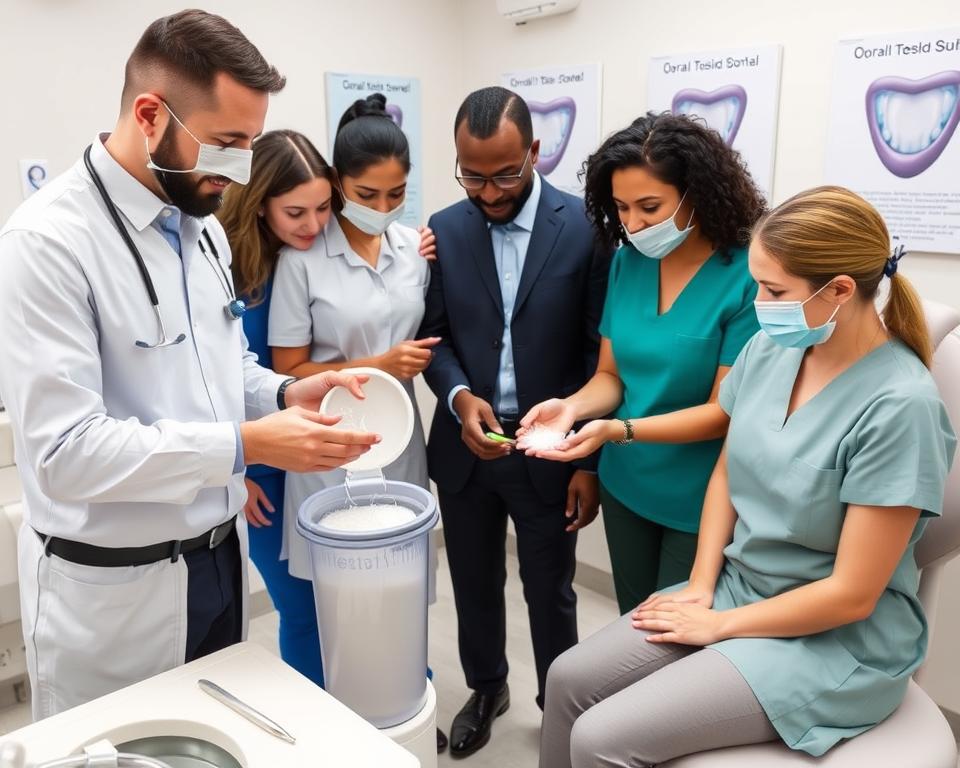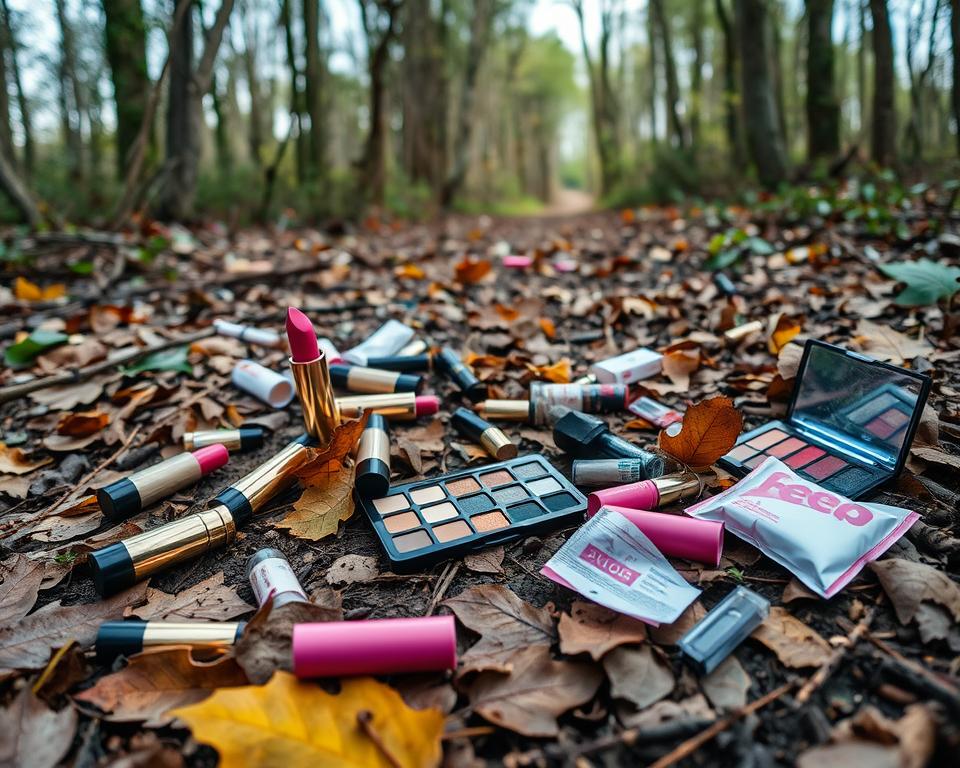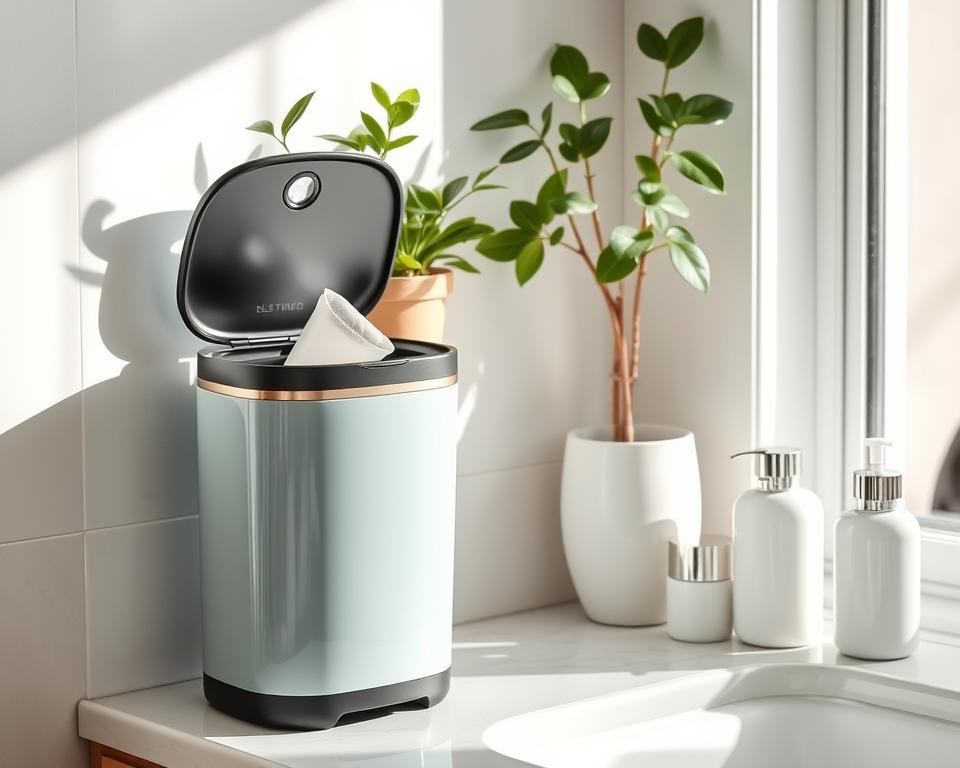As a dental hygienist, I’ve seen firsthand the impact our daily oral hygiene routines can have on the environment. One seemingly innocuous item that often gets overlooked is the humble dental floss. While it may seem insignificant, the proper disposal of used floss is crucial to maintaining a sustainable and eco-friendly lifestyle. In this article, we’ll explore the environmental implications of dental floss waste and provide you with a step-by-step guide on how to dispose of it responsibly.
Key Takeaways
- Dental floss can have a significant environmental impact if not disposed of properly.
- Understand the differences between plastic-based and biodegradable floss to make an informed choice.
- Learn the correct steps to dispose of used floss to minimize waste and promote sustainability.
- Explore eco-friendly alternatives to traditional dental floss to reduce your environmental footprint.
- Discover dental floss recycling programs that can help divert waste from landfills.
Understanding the Environmental Impact of Dental Floss
As consumers become increasingly conscious of the environmental impact of their daily habits, the spotlight has turned to the often-overlooked realm of dental care products, including dental floss. Understanding the differences between plastic-based and biodegradable options, as well as the importance of proper disposal, is crucial in minimizing the environmental footprint of this essential oral hygiene tool.
Plastic-based vs. Biodegradable Dental Floss
Traditional dental floss is typically made from non-biodegradable materials like nylon or polytetrafluoroethylene (PTFE), which can take hundreds of years to decompose. In contrast, biodegradable dental products are gaining popularity as a more environmentally-friendly alternative. These options are often crafted from natural, plant-based fibers that can break down safely and quickly, reducing the impact on the planet.
The Importance of Proper Disposal
Regardless of the material, the environmental impact of dental floss is greatly influenced by how it is disposed of. Improper disposal, such as flushing it down the toilet or throwing it in the regular trash, can lead to the accumulation of floss in waterways, landfills, and natural habitats, harming wildlife and the ecosystem. Adopting green dental practices by following recommended disposal methods is crucial in minimizing waste and protecting the environment.
“Proper disposal of dental floss is not only an environmental necessity but also a personal responsibility we all share in preserving the health of our planet.”
Dispose Dental Floss: A Step-by-Step Guide
Proper disposal of used dental floss is crucial for maintaining a clean and sustainable environment. By following a simple step-by-step process, you can ensure that your dental floss waste is managed responsibly. Let’s explore the steps to dispose of dental floss effectively.
- Wrap the used floss: After finishing your daily flossing routine, wrap the used floss tightly around your finger or a small piece of paper before disposing of it.
- Place in a trash can: Once the floss is wrapped, carefully place it in your regular household trash can. Avoid flushing dental floss down the toilet, as it can clog pipes and harm septic systems.
- Consider biodegradable options: If you’re using biodegradable dental floss, you can dispose of it in a compost bin or designated biodegradable waste collection if available in your area.
- Avoid littering: Never throw used dental floss on the ground or in public spaces. This not only contributes to environmental pollution but can also pose a hazard to wildlife.
By following these simple steps, you can help minimize the impact of dental floss waste on the environment and promote sustainable oral hygiene practices.
| Proper Floss Disposal | Dental Floss Waste Management |
|---|---|
| Wrap used floss before disposal | Avoid flushing floss down the toilet |
| Dispose of floss in the regular trash | Consider biodegradable floss options |
| Avoid littering with used floss | Promote sustainable oral hygiene practices |
“Proper disposal of dental floss is not only good for the environment, but it also helps maintain the cleanliness and safety of our communities.”
By following these guidelines, you can play a vital role in reducing the environmental impact of dental floss waste and contribute to a more sustainable future.
Alternatives to Traditional Dental Floss
In the pursuit of eco-friendly dental care and sustainable oral hygiene, innovative alternatives to traditional, plastic-based dental floss have emerged. These biodegradable dental products offer a more environmentally conscious solution for maintaining healthy teeth and gums.
Exploring Eco-Friendly Options
One popular alternative to conventional dental floss is made from natural, plant-based materials such as silk or bamboo. These eco-friendly floss options biodegrade more easily, reducing the environmental impact compared to their plastic counterparts. Additionally, some brands offer refillable floss holders, further minimizing waste.
- Silk floss: Derived from natural silk fibers, this floss is biodegradable and gentle on teeth and gums.
- Bamboo floss: Crafted from renewable bamboo, this floss is both durable and environmentally friendly.
- Refillable floss holders: Reusable containers that allow you to replace the floss spool rather than discarding the entire product.
Another innovative solution is water flossers, which use high-powered water pressure to clean between teeth and along the gumline. These electric devices eliminate the need for traditional floss, reducing waste while providing a thorough and efficient cleaning experience.
“Switching to eco-friendly dental floss and water flossers is a simple yet impactful way to incorporate sustainable oral hygiene practices into your daily routine.”
By exploring these eco-friendly dental care options, consumers can make a meaningful contribution to reducing plastic waste and promoting a healthier planet, all while maintaining their oral health.
Dental Floss Recycling Programs
As concerns over environmental sustainability grow, many individuals are seeking ways to reduce their overall waste, including the disposal of dental floss. Fortunately, a number of innovative floss recycling programs have emerged to help combat the issue of dental waste reduction.
One such initiative is the “Floss Recycling Program” offered by several dental offices and organizations. This program allows consumers to collect used dental floss and send it to a specialized recycling facility, where the floss is processed and repurposed into new products, such as park benches or plastic lumber.
- Participants simply need to gather their used floss in a sealed, non-recyclable container and mail it to the designated recycling center.
- Many dental practices even provide pre-paid shipping labels to make the process more convenient for their patients.
Beyond direct recycling programs, some communities have also implemented dental waste collection drives, where residents can drop off their used floss and other oral hygiene items for proper disposal and recycling. These events help raise awareness and encourage broader participation in sustainable dental care practices.
| Program | Description | Recycling Outlet |
|---|---|---|
| Floss Recycling Program | Dental offices and organizations collect used floss from patients for recycling | Processed into new products like park benches |
| Dental Waste Collection Drives | Community-based events where residents can drop off used floss and other oral hygiene items | Properly disposed of and recycled |
By leveraging these innovative floss recycling programs, individuals can play a direct role in reducing the environmental impact of their dental care routines and promoting more sustainable oral hygiene practices.
Promoting Sustainable Oral Hygiene Practices
As individuals, we can all play a role in promoting more sustainable oral hygiene practices and reducing dental waste. By making simple changes to our daily routines, we can have a significant impact on the environment while maintaining excellent green dental practices.
Tips for Reducing Dental Waste
Here are some practical tips to help minimize dental waste:
- Choose eco-friendly, biodegradable dental floss made from natural materials like silk or bamboo, instead of plastic-based floss.
- Opt for toothbrushes with replaceable heads or consider using bamboo toothbrushes, which are more sustainable than plastic alternatives.
- Invest in a reusable water flosser or interdental brushes to minimize the use of disposable floss.
- Avoid single-use plastic toothpaste tubes and instead, use toothpaste tablets or powder that comes in a recyclable container.
- Properly dispose of all dental products, ensuring they are recycled or composted whenever possible.
By adopting these simple changes, you can contribute to the overall reduction of dental waste and promote more sustainable oral hygiene practices.
“Small changes can make a big difference when it comes to reducing our environmental impact.”
Remember, every step we take towards green dental practices helps to create a healthier, more sustainable future for our planet.
The Role of Dental Professionals in Floss Disposal Education
As advocates for eco-friendly dental care and sustainable oral hygiene, dental professionals play a crucial role in educating patients about proper floss disposal. By sharing information and guidance, they can empower individuals to make more environmentally conscious choices when it comes to their oral health routine.
Dental professionals have a unique platform to reach a wide audience and influence their patients’ habits. During routine check-ups and cleanings, they can take the time to discuss the importance of responsible floss disposal and provide practical tips to their patients.
- Explain the environmental impact of improper floss disposal, highlighting the issues with plastic-based floss and the benefits of choosing biodegradable alternatives.
- Provide clear instructions on how to safely and sustainably dispose of used dental floss, emphasizing the importance of not flushing it down the toilet.
- Encourage patients to explore eco-friendly floss options, such as those made from natural materials like silk or bamboo.
- Educate patients about floss recycling programs, if available in their local area, and how they can participate in these initiatives.
By incorporating these discussions into their patient interactions, dental professionals can play a vital role in promoting sustainable oral hygiene practices and empowering their patients to make more environmentally conscious choices.
“Dental professionals have a unique opportunity to drive positive change when it comes to floss disposal and overall oral hygiene sustainability.”
Ultimately, the collaboration between dental professionals and their patients is essential in fostering a more eco-friendly dental care culture and reducing the environmental impact of dental waste.
Green Dental Practices: Going Beyond Floss Disposal
As the importance of environmental sustainability gains momentum, the dental industry is also stepping up its efforts to reduce its carbon footprint. Beyond just proper disposal of dental floss, green dental practices are embracing a range of eco-friendly initiatives to promote a healthier planet.
Eco-Friendly Initiatives in Dental Clinics
Dental clinics are increasingly adopting sustainable practices that go far beyond the disposal of dental floss. From energy-efficient office operations to the use of sustainable materials, green dental practices are leading the charge in creating a more environmentally conscious healthcare sector.
- Energy-efficient lighting and equipment
- Paperless patient records and digital charting
- Use of eco-friendly cleaning products and sterilization methods
- Proper disposal of medical waste and hazardous materials
- Incorporation of sustainable materials in dental procedures
- Encouraging patients to adopt eco-friendly dental care practices
By implementing these and other sustainable initiatives, green dental practices are not only reducing their environmental impact but also setting a positive example for patients and the broader dental community. These efforts demonstrate a commitment to environmental responsibility and a desire to create a healthier, more sustainable future.
“Sustainable dentistry is not just a trend, but a necessary evolution in the way we practice. By embracing eco-friendly solutions, we can make a real difference in preserving the health of our planet and the well-being of our patients.”
– Dr. Sarah Greenwood, Sustainability Director at Acme Dental Clinic
Conclusion
As we conclude this exploration of properly disposing dental floss, it’s clear that our choices have a significant impact on the environment. By understanding the environmental consequences of traditional plastic-based floss and embracing eco-friendly, biodegradable alternatives, we can make a meaningful contribution to a greener, more sustainable future.
Proper disposal of dental floss is crucial to prevent it from ending up in our oceans and landfills, where it can harm marine life and disrupt ecosystems. The step-by-step guide provided in this article offers a simple and effective way to responsibly dispose of dental floss and reduce dental floss waste management.
Moreover, exploring eco-friendly dental care options and participating in sustainable oral hygiene practices can further amplify our efforts to create a cleaner, healthier world. By working together with dental professionals and embracing green initiatives in our daily lives, we can collectively make a lasting difference in the fight against plastic pollution and environmental degradation.
FAQ
How can I properly dispose of used dental floss?
The best way to dispose of used dental floss is to wrap it in a small piece of paper or tissue and place it in the trash. Avoid flushing dental floss down the toilet, as it can clog pipes and harm the environment.
What are the environmental impacts of improperly disposing of dental floss?
Dental floss, especially plastic-based varieties, can have a significant environmental impact if not disposed of properly. When flushed down the toilet, it can contribute to the growing issue of microplastic pollution in our waterways and oceans.
Are there any eco-friendly alternatives to traditional dental floss?
Yes, there are several eco-friendly alternatives to traditional dental floss, including floss made from natural, biodegradable materials like bamboo, silk, or plant-based polymers. These options are better for the environment and can be a more sustainable choice for your oral hygiene routine.
Do dental offices offer any dental floss recycling programs?
Some dental offices and organizations do offer dental floss recycling programs. Check with your local dentist or search for dental floss recycling initiatives in your area to see if you can participate in responsible disposal of your used floss.
How can I encourage more sustainable oral hygiene practices in my daily routine?
Beyond proper floss disposal, you can adopt other sustainable oral hygiene practices, such as using an electric toothbrush with a replaceable head, choosing toothpaste in recyclable packaging, and opting for bamboo or compostable toothbrushes. Making small, eco-friendly changes to your routine can have a positive impact on the environment.
